
The lessons of Lackawanna: Terror case leaves lasting mark on New York town
2/26/2006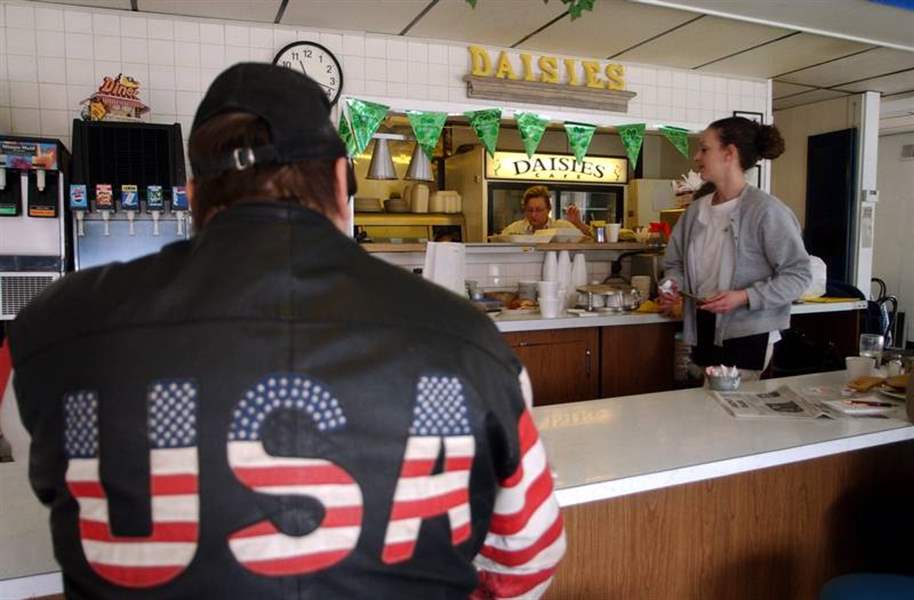
A patriotic local resident takes a seat at the counter of Daisies Cafe in Lackawanna. Some of the men convicted in the terrorism case frequented the diner, a waitress recalled.
LACKAWANNA, N.Y. Norman Polanski, Jr., laments how a reputation for terrorism has tainted his town.
As mayor of this southern suburb of Buffalo, he is well aware of how the federal government found and convicted what it contends was a terrorist sleeper cell that became known nationally as the Lackawanna Six. And he had some advice for Toledo, where three local men were accused of plotting terrorism in a federal indictment unsealed last week.
Every time the feds make a terrorist announcement, they mention Lackawanna. We re sick and tired, we dread hearing about it. You better have a tolerance, or it ll drive you crazy, Mr. Polanski said.
While terrorists have struck targets in New York and Washington, FBI Deputy Director John Pistole warned in announcing the Toledo indictments that terrorists have been found living in cities one might normally discount.
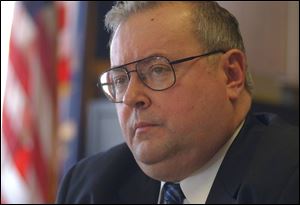
Mayor Norman Polanski, Jr.: Lackawanna mayor says community 'sick and tired' of terrorism references.
These individuals are often hiding in plain sight in cities like Lackawanna, Lodi, Torrance, and now Toledo, he said.
Mr. Polanski has heard the comments multiple times and said Toledo will now have to share the burden.
I ve heard the jokes about Toledo. Everybody has, he said. In the surrounding community, everybody likes to take shots at Lackawanna. You better get ready for it. You re going to have this label now because people like this label.
Six men from Lackawanna all U.S. citizens, who grew up with the sons and daughters of the working-class community received sentences in late 2003 for attending a terrorist training camp in Afghanistan in the spring of 2001.
Some left after 10 days; some stayed for months. All were members of the town s Yemeni community who said they went overseas to receive religious training in Pakistan and did not realize what they were getting into.
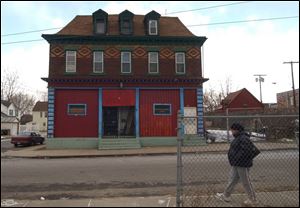
Authorities say much of the activity related to the Lackawanna Six terrorism case was centered at this storefront, which previously housed a delicatessen.
The men, ages 23 to 30 at the time of their trial, pleaded guilty and are serving sentences ranging from seven to 10 years for providing material support to terrorists one of the counts now facing the Toledo three.
A seventh Lackawanna man connected with the cell by federal authorities remains free after tunneling out of a Yemeni prison with other prisoners earlier this month.
Another Lackawanna man related to the group was killed in Yemen in November, 2002, when a car he was riding in was hit by a missile from a Predator drone aircraft.
[The case] caught the community by surprise. This was the last thing that anybody ever expected, said Mayor Polanski, who was City Council president at the time.
Part of the surprise was because Yemenis had lived in Lackawanna since arriving in the 1920s to toil in local steel mills on the Lake Erie shore, joining a melting pot of other immigrants that included Poles and Italians. Roughly 2,500 of the town s population of about 18,500 are from the Middle East, and many live in the western 1st Ward, separated from the rest of the town by a large steel bridge providing passage over the river of railroad tracks.
The Arab community, they were more tense than anybody else after the arrests, Mayor Polanski recalled. They were being hammered. There was no vocal outcry against them, but people were very curious [about their activities].
Mixed feelings
Mohamed Saleh, board chairman of Lackawanna s Masjid Alhuda Guidance Mosque the largest mosque in the Buffalo area said that, in general, Lackawanna was very supportive of the Muslim community in the days and weeks after the arrests.

A patriotic local resident takes a seat at the counter of Daisies Cafe in Lackawanna. Some of the men convicted in the terrorism case frequented the diner, a waitress recalled.
We got a few letters, Mr. Saleh admitted, but he went on to describe how the local leaders of other religions were quick to encourage calm and reach out to the Muslims and Yemenis and asked their congregations to do the same.
His single-story mosque, while the area s largest, is a far cry from Lackawanna s primary tourist attraction: Our Lady of Victory Basilica & National Shrine, a monolithic Roman Catholic landmark that towers above the town s central square and whose patron, Msgr. Nelson Baker, is being considered for sainthood by the Vatican.
But beyond the pulpit, some in the community looked at their neighbors over the tracks with wary eyes.
Mike Kehoe, 68, who grew up in the community, has for nine years leased and run the Downtown Lounge across from city hall. An American flag hung by the door of his bar has embroidery over the blue star field that reads: September 11, 2001.
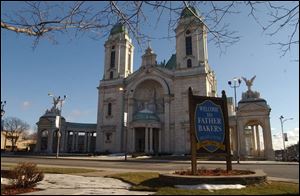
Lackawanna's primary tourist attraction is Our Lady of Victory Basilica & National Shrine, whose patron, Msgr. Nelson Baker, is being considered for sainthood by the Vatican.
Mr. Kehoe remembers the trial, the pleas, the convictions of the Lackawanna men. He said relations with the Yemeni community have yet to smooth over completely.
A lot of us are bitter. It s too bad, he said. Several of the men who were arrested and charged with participation in the terrorist cell were the nicest guys, really nice, he recalled. But [now] I don t trust any of them.
One of his patrons, Ron Schultz, 25, disagreed with the barkeep s assessment of the community s level of uneasiness, saying he thinks things are pretty much back to normal these days.
[Mr. Kehoe] would disagree with me because he didn t go to school with them all, Mr. Schultz said. They were all nice guys. But the fact was, they d been living here for years and years. And what they did, they knew it was wrong.
Betty Schaefer, a waitress at Daisies Cafe on Ridge Street, said she remembers when several of the convicted men frequented her diner.
Yeah, they were nice, but everybody s nice, she said. You never know.
Still, Ms. Schaefer said she was never really worried. We all figured, they re not going to do anything here. They live here, she said. I wasn t going to pull my kids out of school.
Yemeni response
Lackawanna City School District Superintendent Paul Hashem said he remembers the weekend after the six were arrested. That Sunday, he met with 200 Yemeni parents at a local community center and pleaded with them to keep their children in class.
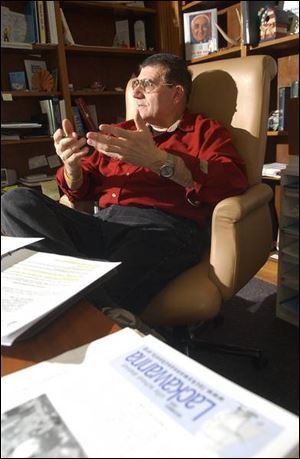
Lackawanna City School District Superintendent Paul Hashem met with nervous Yemeni parents after the arrests in 2002 and successfully pleaded with them to keep their children in class.
They were nervous. Their plan was not to send their children to school, Mr. Hashem said. I told them if you don t, it s going to seem like there s cooperation [with those arrested] in the community.
The next day, every single Yemeni boy came to school with a tie on. And the girls were dressed to the nines, Mr. Hashem said.
Within the Yemeni community, people still hesitate to point fingers at the Six. There was no source of information regarding why the men had gone to Afghanistan and what their intentions were, beyond the federal charges. As a result, Mr. Saleh said, they didn t accuse the men.
Why they went [to Pakistan and Afghanistan] was their business. It was not talked about; it was not known, he said.
There is no source of information regarding their plan or intentions, agreed Mohamed Albanna, the uncle of the Lackawanna man who burrowed out of prison. He said he has not heard from his nephew since the escape.
Mr. Albanna, who is defending himself against federal charges of sending $3.5 million to Yemen without a required license between November, 2001, and December, 2002, said the Lackawanna Six were simply na ve and remorseful.
They relayed that they feel they really betrayed the community, he said.
Still, Mr. Saleh said he believes the sentences were unfair, given that the men had not carried out any terrorist acts.
So many people do, actually do, so many violent crimes and do not receive 10 years, he said.
Mayor Polanski said he d like to keep out of federal anti-terrorism efforts. I don t like to interfere or know any more than I have to, he said.
Punch lines and jabs
The reputation brought by the case of the Lackawanna Six just won t go away.
Mr. Schultz said he remembers attending a comedy club earlier this month in the nearby Buffalo suburb of Lancaster. There, a local comedian made two jokes about Lackawanna.
Mr. Schultz can t remember exactly how they went something about terrorism but he remembers the punch line: How would you like to live in Lackawanna? Ha ha.
Mayor Polanski related what one neighboring community, which he declined to identify because he is involved with cooperative regional programs, wrote on its application for U.S. Department of Homeland Security dollars: We live next door to Lackawanna.
He laughed.
I tried to get some homeland security monies, for additional police cars and what not. They said, You re not the home of suspected targets; you re the home of suspected terrorists.
But the new imam, or religious leader, of the city s mosque, Ibrahim Zidan, who arrived from Cleveland in September, said the Lackawanna Six were never discussed during his vetting for his new position.
I didn t know anything about it. I got to know the children, and people said, Oh, his father, he s among the ones in prison, he s one of the Lackawanna Six, Mr. Zidan said. That was it.
Other cities, other cases
One of Mr. Pistole s examples of domestic terrorism cases is still in court.
In Lodi, a central Californian town of 62,000, an ice cream truck driver and his son both U.S. citizens were indicted in September, the son for attending a terrorist training camp and thus providing material support to terrorists. The father was indicted for lying about it to federal officials.
The son, Hamid Hayat, 23, returned to Lodi from Pakistan in May. His flight was diverted; he was detained and questioned and several days later failed a polygraph examination, according to court papers.
After questioning, the prosecution said, Mr. Hayat confessed to attending a jihadist training camp near the town of Balakot in Pakistan. The confession came after FBI officials suggested to Mr. Hayat that they had satellite pictures of him at the camp, a special agent testified in Sacramento federal court earlier this month. The agent admitted on cross-examination that no such photo existed.
Mr. Hayat s attorney told the court his client was telling the FBI what it wanted to hear to bring his interrogation to an end.
Months before, two Muslim clerics who once taught at a mosque in the town one of whom, a federal agent testified, was an intermediary for Osama bin Laden were deported to Pakistan for immigration violations.
Case implodes
A federal terrorism case unfolded in one city that Mr. Pistole did not mention when announcing the Toledo indictments: Detroit.
The case involved three men detained after a raid on a southwest Detroit apartment the week after the Sept. 11, 2001, terrorist attacks, and a fourth arrested in North Carolina in November, 2002. The apartment was very close to Dearborn, home of the most concentrated Arab-American population in the United States.
The three Moroccans and an Algerian, three of whom had worked at Detroit Metropolitan Airport, were accused of being members of a sleeper operational combat cell.
In June, 2003, two of the men were convicted of providing material support for terrorists. A third was convicted of document fraud. Attorney General John Ashcroft originally hailed the case as an example of success for domestic law enforcement in the war against terrorism.
But all three men eventually were acquitted of all charges by September, 2004. Department of Justice officials did not return calls from The Blade seeking comment on the case.
A review by federal prosecutors suggested the former prosecutor who led the case, Richard Convertino, knowingly withheld evidence he should have shown to defense attorneys, including a letter from a former cellmate of the government s primary witness that suggested he was lying.
Mr. Convertino said the Department of Justice was retaliating against him for his agreement to testify last year before the Senate Finance Committee about terrorism.
U.S. District Judge Gerald E. Rosen, who handled the Detroit case, also chastised Mr. Ashcroft for praising the witness after he had placed a ban on public comment.
If you declare war, you want to win, said William Swor, a Detroit attorney who represented one of the defendants. It was deliberately intended to get a conviction where they knew there was no evidence.
Contact Tad Vezner at: tvezner@theblade.com or 419-724-6065.